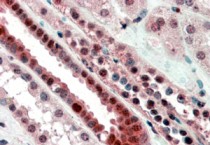ARG64126
anti-TCF3 / ITF1 antibody
anti-TCF3 / ITF1 antibody for IHC-Formalin-fixed paraffin-embedded sections,Western blot and Human
Developmental Biology antibody; Gene Regulation antibody; Signaling Transduction antibody
Overview
| Product Description | Goat Polyclonal antibody recognizes TCF3 / ITF1 |
|---|---|
| Tested Reactivity | Hu |
| Tested Application | IHC-P, WB |
| Host | Goat |
| Clonality | Polyclonal |
| Isotype | IgG |
| Target Name | TCF3 / ITF1 |
| Antigen Species | Human |
| Immunogen | C-KAPRARTSPDEDED |
| Conjugation | Un-conjugated |
| Alternate Names | TCF-3; E47; VDIR; Class B basic helix-loop-helix protein 21; Immunoglobulin transcription factor 1; Transcription factor 3; Kappa-E2-binding factor; bHLHb21; E2A; Transcription factor ITF-1; Transcription factor E2-alpha; ITF1; Immunoglobulin enhancer-binding factor E12/E47 |
Application Instructions
| Application Suggestion |
|
||||||
|---|---|---|---|---|---|---|---|
| Application Note | IHC-P: Antigen Retrieval: Steam tissue section in Citrate buffer (pH 6.0). WB: Recommend incubate at RT for 1h. * The dilutions indicate recommended starting dilutions and the optimal dilutions or concentrations should be determined by the scientist. |
Properties
| Form | Liquid |
|---|---|
| Purification | Purified from goat serum by antigen affinity chromatography. |
| Buffer | Tris saline (pH 7.3), 0.02% Sodium azide and 0.5% BSA. |
| Preservative | 0.02% Sodium azide |
| Stabilizer | 0.5% BSA |
| Concentration | 0.5 mg/ml |
| Storage Instruction | For continuous use, store undiluted antibody at 2-8°C for up to a week. For long-term storage, aliquot and store at -20°C or below. Storage in frost free freezers is not recommended. Avoid repeated freeze/thaw cycles. Suggest spin the vial prior to opening. The antibody solution should be gently mixed before use. |
| Note | For laboratory research only, not for drug, diagnostic or other use. |
Bioinformation
| Database Links | |
|---|---|
| Background | This gene encodes a member of the E protein (class I) family of helix-loop-helix transcription factors. E proteins activate transcription by binding to regulatory E-box sequences on target genes as heterodimers or homodimers, and are inhibited by heterodimerization with inhibitor of DNA-binding (class IV) helix-loop-helix proteins. E proteins play a critical role in lymphopoiesis, and the encoded protein is required for B and T lymphocyte development. Deletion of this gene or diminished activity of the encoded protein may play a role in lymphoid malignancies. This gene is also involved in several chromosomal translocations that are associated with lymphoid malignancies including pre-B-cell acute lymphoblastic leukemia (t(1;19), with PBX1), childhood leukemia (t(19;19), with TFPT) and acute leukemia (t(12;19), with ZNF384). Alternatively spliced transcript variants encoding multiple isoforms have been observed for this gene, and a pseudogene of this gene is located on the short arm of chromosome 9. [provided by RefSeq, Sep 2011] |
| Research Area | Developmental Biology antibody; Gene Regulation antibody; Signaling Transduction antibody |
| Calculated MW | 68 kDa |
| PTM | Phosphorylated following NGF stimulation. |
Images (2) Click the Picture to Zoom In
-
ARG64126 anti-TCF3 / ITF1 antibody WB image
Western Blot: Daudi cell lysate (35 µg protein in RIPA buffer) stained with ARG64126 anti-TCF3 antibody at 0.01 µg/ml dilution.
-
ARG64126 anti-TCF3 / ITF1 antibody IHC-P image
Immunohistochemistry: paraffin embedded Human Kidney. (Steamed antigen retrieval with citrate buffer pH 6) stained with ARG64126 anti-TCF3 antibody at 3.8 µg/ml dilution followed by AP-staining.







